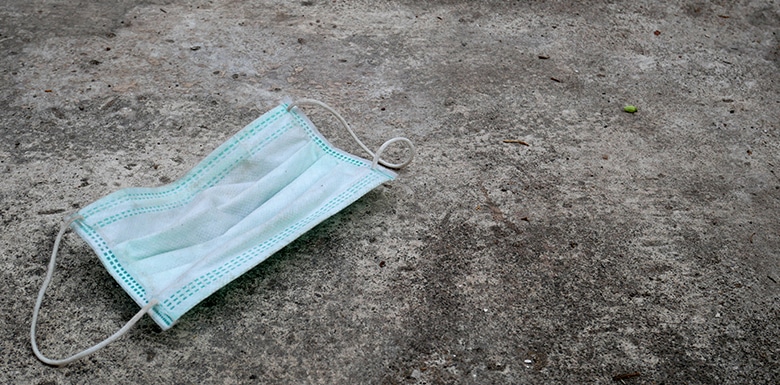
Can Police Get DNA from Your Face Mask?
Published: Jul 30, 2020 in Sex CrimesAs of early July 2020, Gov. Greg Abbott ordered Texans to wear face masks when in public. This comes in response to COVID-19, and to hopefully slow the spread through hygienic practices, like social distancing, hand washing, and wearing face masks. But like many government actions, there might be some unintentional consequences to wearing masks in public, like unknowingly providing DNA evidence in criminal cases.
DNA from a Mask Without a Warrant
In June, King City Police in California were able to take a DNA sample from a suspect’s face mask and use it to connect him to the rape of a child. The police asked the suspect to come to the station to discuss another crime. But once he arrived, they offered him a fresh mask. He accepted and discarded his used mask, which officers submitted for DNA analysis.
It’s an important lesson for everyone. Since the suspect discarded his own face mask, the police were able to submit it for DNA analysis without a warrant. This is similar to picking up a used Kleenex or anything thrown away that may contain DNA evidence. And while this police tactic is effective to circumvent getting a warrant, getting evidence this way isn’t faultless. If you or a loved one are charged with a crime and DNA evidence is involved, make sure you work with an experienced defense attorney who will scrutinize how the sample was obtained and analyzed to determine the most effective defense strategy.
Do Masks Have DNA on Them?
The reason masks help slow the spread of COVID-19 is because they reduce how many droplets of saliva enter the air. Everyone spreads droplets when they talk, though they spread them furthest when they cough or sneeze. The coronavirus and other bacteria and viruses travel on these droplets, which is how people are exposed.
DNA, which is found in various biological substances, like blood, semen, and hair, is also present in saliva. Therefore your DNA can be discovered in all sorts of places, like your toothbrush, hairbrushes, dirty laundry, stamps, gloves, and face masks.
As a result, anyone suspected of a crime should be aware that their face mask could contain DNA through the droplets of saliva they expel when they breathe, talk, cough, and sneeze.
Is a DNA Test on a Mask Accurate?
That being said, a DNA test from a mask isn’t inherently strong evidence in a sex crimes case. DNA testing is never as infallible as law enforcement or TV wants people to believe. In the case of face masks, many factors can make a DNA sample unreliable.
DNA testing needs a sufficient amount of biological material or at least a small amount of a high-quality sample. A face mask might not provide either.
Various factors can contaminate the DNA sample too, like eating, drinking, or smoking. Bacteria and viruses might contaminate the DNA. The result is that the DNA on your mask might not be a high enough quality for an accurate analysis.
Another issue is the type of DNA test law enforcement performed. There are many valid concerns about rapid DNA testing in Houston. Traditional DNA testing takes time and is performed by trained lab technicians. On the other hand, anyone can perform new rapid DNA testing methods.
While some local law enforcement agencies use rapid DNA testing, the FBI does not. Why? Because this type of analysis doesn’t differentiate between multiple sources of DNA and runs the risk of incorrect matches.
Legal Recommendations for Face Masks
Should you stop wearing a face mask because it might contain your DNA? No, you should adhere to the mandate requiring you to wear face masks while in public. This practice is essential for your health and the health of others. But you should always be aware of where your face mask is when you aren’t wearing it.
Some recommendations for face masks are:
- Never set your mask down in a public place: If you need to take your mask off to eat, drink, or exercise, place it securely in a bag or your pocket.
- Never discard your mask in public: Do not throw your mask away in a public trash can, even when you put a fresh mask on. Keep the old mask with you until you can discard it at home.
- Never voluntarily give your mask to the police: If the police attempt to question you at work or your home, or ask you to come down to the station, call a criminal defense attorney immediately. Never voluntarily give them your mask or discard it near the police.
- Wear a washable, reusable mask: Instead of relying on one-time-use masks that you might discard after a few hours, purchase a cloth mask that you can wash after each use. Reusable masks ensure you aren’t throwing out a potential DNA source.
Are You Facing Sex Crime Allegations or Charges?
When you are accused of committing a sex offense, it’s imperative you take steps to protect yourself. Don’t talk with family, friends, or the alleged victim about the circumstances. Most importantly, don’t voluntarily talk with the police or supply a DNA sample. Call a Houston sex crimes attorney to represent you as soon as possible.
Attorney Ned Barnett has decades of experience defending Texans from sex crime allegations and a history of securing the best possible resolutions. You can reach The Law Offices of Ned Barnett online or by calling (713) 222-6767. We offer free, initial consultations where you can discuss your situation and options in confidence with a veteran defense lawyer.
